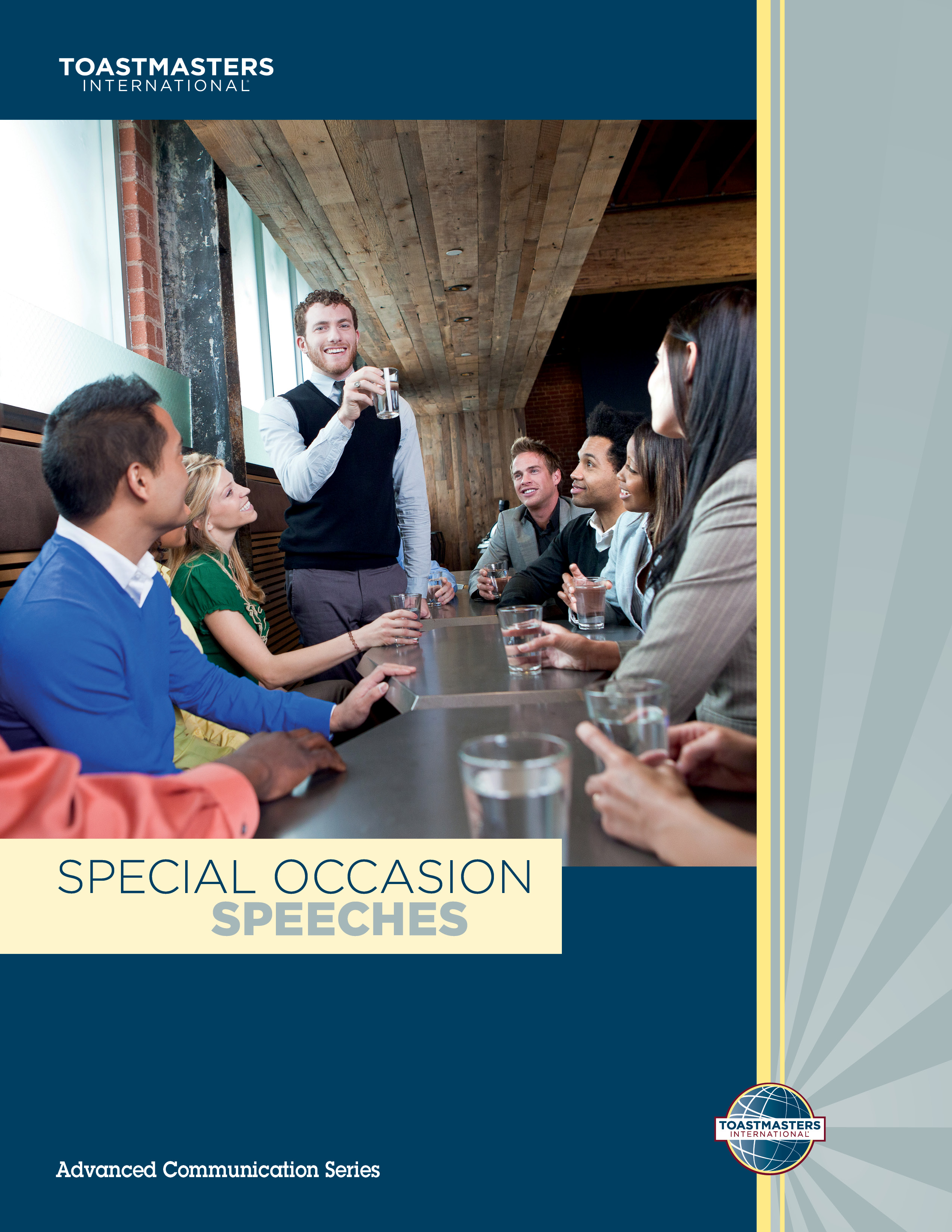Project #1: Mastering The Toast
Executive Summary:
Weddings, anniversaries and other celebrations often call for a toast. A toast bestows best wishes as well as hopes for health, happiness, good fortune and other positive thoughts. A good toast has an opening, body and conclusion and fits the occasion in both mood and language. When giving a toast, take care not to embarrass anyone and be sensitive to audience and to the occasion.
Objectives:
- Recognize the characteristics of a toast.
- Present a toast honoring an occasion or a person.
- TIME : 2 to 3 minutes
The purpose of this project is for the speaker to present a two- to three- minutes toast in honor of a person or special occasion. The toast is to be original, and the audience is to serve as the “guests” at the toast. The toast must clearly state the occasion or person being honored and be personalized through stories, anecdotes or quotes relating to the subject. It is suggested you read the entire project before the presentation. In addition to your oral evaluation, please give written responses to the questions below.
Project #2: Speaking In Praise
Executive Summary:
At some time you will be called upon to speak in praise of someone - perhaps at a retirement banquet, anniversary celebration or the funeral of a friend or family member. The most successful speeches of praise are inspirational, pointing out the meaning of another person's life and relating that meaning to our own lives. Talk about the individual and his or her accomplishments, including the qualities that made the person worthy of praise and the lessons we may learn from the person.
Objectives:
- Prepare a speech praising or honoring someone, either living or dead.
- Address five areas concerning the individual and his/her accomplishments.
- Include anecdotes illustrating points within the speech.
- TIME : 5 to 7 minutes
The purpose of this project is for the speaker to present a 5 to 7 minutes speech praising a friend, relative or co-worker. The occasion – e.g., funeral, retirement banquet, anniversary or farewell party – has been selected by the speaker. The speech is to be inspirational, pointing out the qualities of the individual and the meaning of the individual’s life, as well as relating that meaning to our own lives. In addition to your oral evaluation, please give written responses to the questions below.
Project #3: The Roast
Executive Summary:
A roast is another way to honor or recognize a person. Unlike the speech of praise in Project 2, a roast relies on wit, humor and satire to convey its message. The guest of honor must be agreeable and capable of handling the jokes. Carefully select jokes and anecdotes that relate to the guest of honor, making sure that your material will not hurt the guest of honor's feelings. Rehearse your stories and jokes and make sure your punch lines can be heard.
Objectives:
- Poke fun at a particular individual in a good-natured way.
- Adapt and personalize humorous material from other sources.
- Deliver jokes and humorous stories effectively.
- TIME : 3 to 5 minutes
The purpose of this project is for the speaker to present a three- to five- minutes “roast”. The occasion – retirement banquet, anniversary or farewell party, etc. – has been selected by the speaker. The roast is to include jokes and anecdotes adapted from other sources to apply to the honored guest. In addition to your oral evaluation, please give written responses to the questions below.
Project #4: Presenting An Award
Executive Summary:
How an award is presented conveys to the audience and the recipient how important the award and the accomplishments it recognizes are. Be sure to explain the purpose of the award, why the organization presents it, and what the recipient did to deserve it. Point out the recipient's dedications, sacrifices and contributions, and give examples. Keep your remarks brief. The star of the event should be the award recipient, not the presenter.
Objectives:
- Present an award with dignity and grace.
- Acknowledge the contributions of the recipient.
- TIME : 3 to 4 minutes
The purpose of this project is for the speaker to present an award with dignity, grace and sincerity. The presentation speech should be three to four minutes in length. The speaker will explain the purpose of the award and why the recipient deserves it. In addition to your oral evaluation, please give written responses to the questions below.
Project #5: Accepting An Award
Executive Summary:
Accepting an award graciously requires thought and preparation. Your acceptance speech should display gratitude to the organization giving the award, acknowledging the organization's work and its importance, and sincerity. Be modest and dignified. Keep your acceptance speech brief. As you accept the award, stand slightly sideways toward the audience, reach for and take it with the hand nearest the presenter, then hold it in full view of the audience.
Objectives:
- Accept an award with dignity, grace and sincerity.
- Acknowledge the presenting organization.
- TIME : 5 to 7 minutes
The purpose of this project is for the speaker to accept an award with dignity, grace and sincerity. The acceptance speech is to be five to seven minutes in length and given without notes. The speaker is to acknowledge those who helped him or her and recognize the importance and work of the presenting organization. In addition to your oral evaluation, please give written responses to the questions below.
For more information:
226N

No comments:
Post a Comment